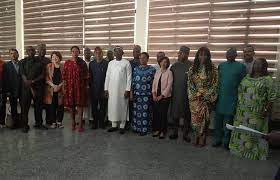The Minister of Water Resources and Sanitation, Professor Joseph Terlumun Utsev, has disclosed that several high-level initiatives demonstrate the federal government’s political will in reversing the narrative on poor WASH indices.
According to Prof Utsev, it will also accelerate access to sustainable services in the institutions and public places.
Prof. Utsev stated this Thursday during the FG/UNICEF Annual Wash Review meeting in Abuja.
He said the government is concerned that access to Sanitation and Hygiene services has worrisomely lagged behind access to Water Supply both at national and global levels.
“According to the 2021 WASHNORM Report, access to basic Water Supply, Sanitation and Hygiene Services in Nigeria were estimated at 67 per cent, 46 per cent and 17 per cent respectively. WASH issues have been determined to be fundamental to economic and social development. It also has a crosscutting impact on different Sectors, mainly health, education, economy, amongst others.
“Consequently, achieving the WASH targets under SDG 6 in Nigeria is critical as it will contribute to the achievement of our developmental goals as a nation, with regional and global implications in view of the country’s strategic position.
“Over the years, the federal government has consistently ensured that the implementation of policies and programmes are designed to address identified Sector gaps, improve access to services and demonstrate its commitment and prioritization of WASH.
“These high-level initiatives clearly demonstrate the strong political will of the Federal Government in reversing the narrative on Nigeria’s poor WASH indices and accelerating access to sustainable services in our institutions and public places,” he said.
Speaking during the workshop, UNICEF Deputy Representative Dr. Rownak Khan, emphasised the body’s commitment to addressing the challenges faced by children in the country, calling for deliberate funding of $9 billion annually for the WASH sector.
Khan highlighted UNICEF’s multifaceted programmes aimed at ensuring fundamental social services for children, with a particular focus on access to clean water and sanitation.
Expressing concern over the widespread issue of contaminated water affecting a significant percentage of children, Khan revealed that 68 per cent of available water sources were contaminated with harmful organisms.
She said collaborating with the government and various partners, UNICEF would facilitate gradual and progressive access to clean water for children.
“In addition to addressing water contamination, the organisation is actively involved in training local counterparts to maintain functional water points and improve access to clean sanitary facilities.
“These efforts are part of the Clean Nigeria campaign, which aims to eliminate open defecation practices.
“Moreover, UNICEF’s engagement extends beyond the school environment, reaching communities where access to clean water and sanitation is essential for all children, whether in school or not”.
Discussing the impact of climate change on children, Khan referred to a November-launched report analysing the vulnerability of Nigerian children to diverse climate-related challenges, such as droughts and floods.
She said UNICEF plans to collaborate with the Ministry of Environment and the Ministry of Water and Sanitation to formulate an action plan in response to these climate challenges.
